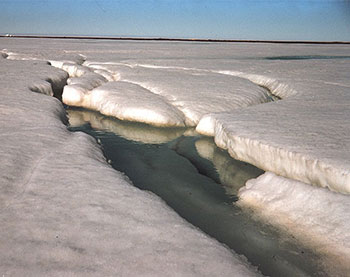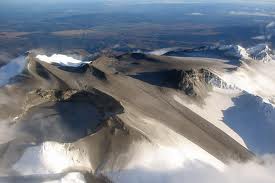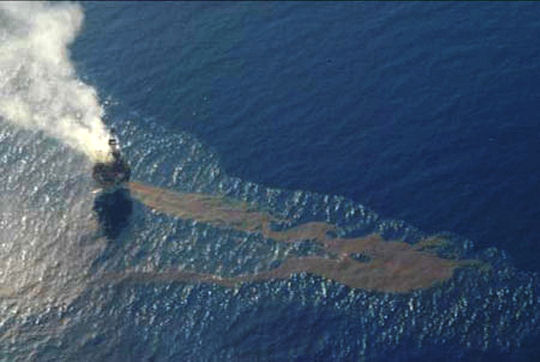|
|
|
|
|
|
|
|
No Arctic-science events are announce for today.
|
Media
 China's Polar Strategy: An Emerging Gray Zone? China's Polar Strategy: An Emerging Gray Zone? More than 80 percent of tourists on Russian icebreaker tours to the North Pole are Chinese - an indication that government-encouraged "patriotic tourism" may be reaching the world's most remote regions. Aside from tourism, Chinese strategic interests in both the Arctic and Antarctica reflect classic grand strategic objectives: power and resources (fish, minerals, and hydrocarbons). Both polar regions can be understood through the lens of "extraterritorial spaces" that connect Antarctica, the high seas, and space, in which a rising power like China can extend and leverage growth. They are ideal spaces in which to pursue "gray zone" campaigns to reshape the balance of power, using all levers of state power while remaining under escalatory thresholds. China's successful exploitation of gray zones elsewhere stands as a clear warning that the United States risks acquiescing in the key frontiers of 2050: the poles. The Diplomat
Russia is Building $320 Million Icebreakers to Carve New Arctic Routes. Until factories open on the moon or Mars, there's no less hospitable an industrial workplace than Yamal LNG, a $27 billion liquid natural gas plant that lies in Russian territory 375 miles north of the Arctic Circle. In the winter, when there's zero sun for more than two months, temperatures reach -13F on land and -58F in the blinding fog out at sea. But there's a lot of fossil fuel in this wasteland-44 trillion cubic feet, the equivalent of about 8 billion barrels of oil. So Yamal LNG, controlled by Russian natural gas producer Novatek, has brought together partners to spend an unprecedented sum on a new kind of transportation that will be here much faster than self-driving cars or a casual afternoon spaceflight. Conventional tankers still can't handle the ice in the Arctic's Kara Sea-even though it's slowly but surely melting because of global warming. Bloomberg Businessweek
 The Future of the Arctic Economy. The Future of the Arctic Economy. The economic potential of the Arctic is vast, but the complexities of the region must be considered when analyzing the future of the Arctic. While the region north of the Arctic Circle is commonly viewed as a singular expanse, the reality is rather different. Within the Arctic - and amongst the eight Arctic nations - there exists noteworthy similarities but also tremendous variations. Indeed, the Arctic is a diverse part of the world that would be best characterized as several different subregions, all with unique resources, populations, accessibility, geostrategic importance, and challenges. It is critical to analyze economic drivers and political factors across the High North in order to evaluate the economic potential of the region, understand national security interests, and develop appropriate Arctic policy. The Maritime Executive
Societal Impacts of a Rapidly Changing Arctic. Change has been termed a normal state of affairs in the Arctic, but the pace and extent of current ecological and societal transformations are unprecedented. Climate change is seen as the most pervasive and powerful driver of change, with temperatures in the Arctic having risen twice as rapidly as the global average over the past 50 years. In addition, rapid social and economic developments, such as migration, tourism, resource extraction, shifting political relations, geopolitics, and more generally the forces of globalization, have far-reaching impacts on the Arctic's social, ecological, and socio-ecological systems. The Arctic Institute
 Charcoal: Major Missing Piece in the Global Carbon Cycle. Charcoal: Major Missing Piece in the Global Carbon Cycle. Most of the carbon resulting from wildfires and fossil fuel combustion is rapidly released into the atmosphere as carbon dioxide. Researchers at the University of Zurich have now shown that the leftover residue, so-called black carbon, can age for millennia on land and in rivers en route to the ocean, and thus constitutes a major long-term reservoir of organic carbon. The study adds a major missing piece to the puzzle of understanding the global carbon cycle. Phy.org
|
|
Future Events
 Coastal Response Research Center Requests Input on the State of Science on Dispersant Use in the Arctic. The Coastal Response Research Center (CRRC) recently collected statements and reports on five topic areas related to dispersant use in the Arctic: efficacy and effectiveness; physical transport and chemical behavior; degradation and fate; eco-toxicity and sublethal impacts; and, public health and food safety. CRRC request written input on the statements the scientists made on the state-of-the-science regarding dispersant use, particularly as it applies to Arctic waters. Written comments are requested by July 13th. More information on this initiative is available here. Coastal Response Research Center Requests Input on the State of Science on Dispersant Use in the Arctic. The Coastal Response Research Center (CRRC) recently collected statements and reports on five topic areas related to dispersant use in the Arctic: efficacy and effectiveness; physical transport and chemical behavior; degradation and fate; eco-toxicity and sublethal impacts; and, public health and food safety. CRRC request written input on the statements the scientists made on the state-of-the-science regarding dispersant use, particularly as it applies to Arctic waters. Written comments are requested by July 13th. More information on this initiative is available here.
17th International Congress of Circumpolar Health (ICCH17), August 12-15, 2018 (Copenhagen, Denmark). The ICCH congresses are held every third year in different locations in the circumpolar area and represent the largest scientific meetings worldwide on circumpolar health. The ICCH congresses serve as the primary source of information exchange and scholarly communication in issues relating to circumpolar health. More than 750 participants generally register and participate in each Congress, and more than 400 scientific papers or posters are usually presented.
UArctic Congress 2018, September 3-7, 2018 (Oulu and Helsinki, Finland). The UArctic Congress 2018 will bring together key UArctic meetings and a science conference into one single gathering, including business meetings of the Council of UArctic, Rectors' Forum, Student Forum, and Thematic Networks & UArctic Institutes Leadership Team. The Congress is an integral part of the Finland's Arctic Council chairmanship program, and open to the public. The event will highlight the themes and priorities of the Finnish chairmanship, including the goals of the United Nations' 2030 Agenda for Sustainable Development, and the Paris Agreement under the UN Framework Convention on Climate Change.
Scientific Exploration of the Arctic and North Pacific (SEA-NorP), September 25-27, 2018 (Mt. Hood, Oregon USA). This workshop will include discussion of hypotheses that can be tested by scientific drilling in the region, the technology necessary to achieve those goals, ideal sites for drilling based on existing data, and where additional site survey data is needed. The goal of the workshop organizers is that multiple proposals will be initiated at the workshop, both for full cruise legs and for shorter, targeted expeditions around the following themes: ocean gateways, geohazards, volatile cycling, ice histories at transition zones, biosphere and climate.
The second Arctic Biodiversity Congress is hosted by the Conservation of Arctic Flora and Fauna (CAFF), the biodiversity working group of the Arctic Council, and the Ministry of the Environment, Finland. The second Arctic Biodiversity Congress will build on the success of the first Congress, held in 2014 in Trondheim, Norway, and will bring together scientists, policymakers government officials, Indigenous representatives, Traditional Knowledge holders, industry, non-governmental organizations, and others to promote the conservation and sustainable use of Arctic biodiversity.
** New this week ** Arctic Circle Assembly, October 2018 (Reykjavik, Iceland). The annual Arctic Circle Assembly is the largest annual international gathering on the Arctic, attended by more than 2000 participants from 60 countries. It is attended by heads of states and governments, ministers, members of parliaments, officials, experts, scientists, entrepreneurs, business leaders, indigenous representatives, environmentalists, students, activists and others from the growing international community of partners and participants interested in the future of the Arctic.
** New this week ** Arctic Science Forum Associated with the 2nd Arctic Science Ministerial, October 25, 2018 (Berlin, Germany and via webcast). How vulnerable and how resilient are nature and the people of the Arctic region? How well do we understand the regional and global dynamics which are driving change in the Arctic? What impact will change in the Arctic have on us? These and other questions are the focus of this two-day conference. It will take interdisciplinary research in the Arctic to gain an understanding of past and future processes - a complex and cost-intensive venture. This makes an international network of Arctic research so important for delivering better results. Cooperation in research, the exchange of data, collaborative observation and monitoring schemes - international cooperation is imperative in research on the Arctic. Only the Science Forum on October 25th will be webcast.
** New this week ** American Geophysical Union Fall meeting, December 10-14, 2018 (Washington, DC USA). The AGU 2018 Fall Meeting will mark another dynamic year of discovery in Earth and space science, serve as the advent of AGU's Centennial year, and provide a special opportunity to share our science with world leaders in Washington, D.C. As the largest Earth and space science gathering in the world, the Fall Meeting places you in the center of a global community of scientists drawn from myriad fields of study whose work protects the health and welfare of people worldwide, spurs innovation, and informs decisions that are critical to the sustainability of the Earth.
** New this week ** Arctic Frontiers, January 20-25, 2019 (Tromso, Norway). The Arctic Frontiers started out in 2006 assembling the first global scientific conference on economic, societal and environmental sustainable growth in the north. In January 2019, the hosts will arrange the 13th conference with the theme "Smart Arctic". The conference has a pan arctic perspective and builds new partnerships across nations, generations and ethnic groups. Arctic Frontiers provides a forum for dialogue and communication between science, government and industry in the Arctic. In 2019, the Arctic Frontiers plenary program will have five main sessions with the following tentative working titles: State of the Arctic, Blue Growth, Smart Solutions, Bridging the gap and Arctic business prospects. Following the plenary, we will organize an abstract driven science program addressing Plastics in the Ocean, the Future of Governance and Handling Vulnerability in Arctic Ecosystems, State of the Arctic and A Smart Arctic Future.
|
|

  
4350 N. Fairfax Drive, Suite 510
Arlington, VA 22203, USA
External links in this publication, and on the USARC's World Wide Web site ( www.arctic.gov) do not constitute endorsement by the US Arctic Research Commission of external Web sites or the information, products or services contained therein. For other than authorized activities, the USARC does not exercise any editorial control over the information you may find at these locations. These links are provided consistent with the stated purpose of this newsletter and the USARC Web site.
|
|
|
|
|
|
|
|
|
 China's Polar Strategy: An Emerging Gray Zone? More than 80 percent of tourists on Russian icebreaker tours to the North Pole are Chinese - an indication that government-encouraged "patriotic tourism" may be reaching the world's most remote regions. Aside from tourism, Chinese strategic interests in both the Arctic and Antarctica reflect classic grand strategic objectives: power and resources (fish, minerals, and hydrocarbons). Both polar regions can be understood through the lens of "extraterritorial spaces" that connect Antarctica, the high seas, and space, in which a rising power like China can extend and leverage growth. They are ideal spaces in which to pursue "gray zone" campaigns to reshape the balance of power, using all levers of state power while remaining under escalatory thresholds. China's successful exploitation of gray zones elsewhere stands as a clear warning that the United States risks acquiescing in the key frontiers of 2050: the poles. The Diplomat
China's Polar Strategy: An Emerging Gray Zone? More than 80 percent of tourists on Russian icebreaker tours to the North Pole are Chinese - an indication that government-encouraged "patriotic tourism" may be reaching the world's most remote regions. Aside from tourism, Chinese strategic interests in both the Arctic and Antarctica reflect classic grand strategic objectives: power and resources (fish, minerals, and hydrocarbons). Both polar regions can be understood through the lens of "extraterritorial spaces" that connect Antarctica, the high seas, and space, in which a rising power like China can extend and leverage growth. They are ideal spaces in which to pursue "gray zone" campaigns to reshape the balance of power, using all levers of state power while remaining under escalatory thresholds. China's successful exploitation of gray zones elsewhere stands as a clear warning that the United States risks acquiescing in the key frontiers of 2050: the poles. The Diplomat The Future of the Arctic Economy. The economic potential of the Arctic is vast, but the complexities of the region must be considered when analyzing the future of the Arctic. While the region north of the Arctic Circle is commonly viewed as a singular expanse, the reality is rather different. Within the Arctic - and amongst the eight Arctic nations - there exists noteworthy similarities but also tremendous variations. Indeed, the Arctic is a diverse part of the world that would be best characterized as several different subregions, all with unique resources, populations, accessibility, geostrategic importance, and challenges. It is critical to analyze economic drivers and political factors across the High North in order to evaluate the economic potential of the region, understand national security interests, and develop appropriate Arctic policy. The Maritime Executive
The Future of the Arctic Economy. The economic potential of the Arctic is vast, but the complexities of the region must be considered when analyzing the future of the Arctic. While the region north of the Arctic Circle is commonly viewed as a singular expanse, the reality is rather different. Within the Arctic - and amongst the eight Arctic nations - there exists noteworthy similarities but also tremendous variations. Indeed, the Arctic is a diverse part of the world that would be best characterized as several different subregions, all with unique resources, populations, accessibility, geostrategic importance, and challenges. It is critical to analyze economic drivers and political factors across the High North in order to evaluate the economic potential of the region, understand national security interests, and develop appropriate Arctic policy. The Maritime Executive Charcoal: Major Missing Piece in the Global Carbon Cycle. Most of the carbon resulting from wildfires and fossil fuel combustion is rapidly released into the atmosphere as carbon dioxide. Researchers at the University of Zurich have now shown that the leftover residue, so-called black carbon, can age for millennia on land and in rivers en route to the ocean, and thus constitutes a major long-term reservoir of organic carbon. The study adds a major missing piece to the puzzle of understanding the global carbon cycle. Phy.org
Charcoal: Major Missing Piece in the Global Carbon Cycle. Most of the carbon resulting from wildfires and fossil fuel combustion is rapidly released into the atmosphere as carbon dioxide. Researchers at the University of Zurich have now shown that the leftover residue, so-called black carbon, can age for millennia on land and in rivers en route to the ocean, and thus constitutes a major long-term reservoir of organic carbon. The study adds a major missing piece to the puzzle of understanding the global carbon cycle. Phy.org

